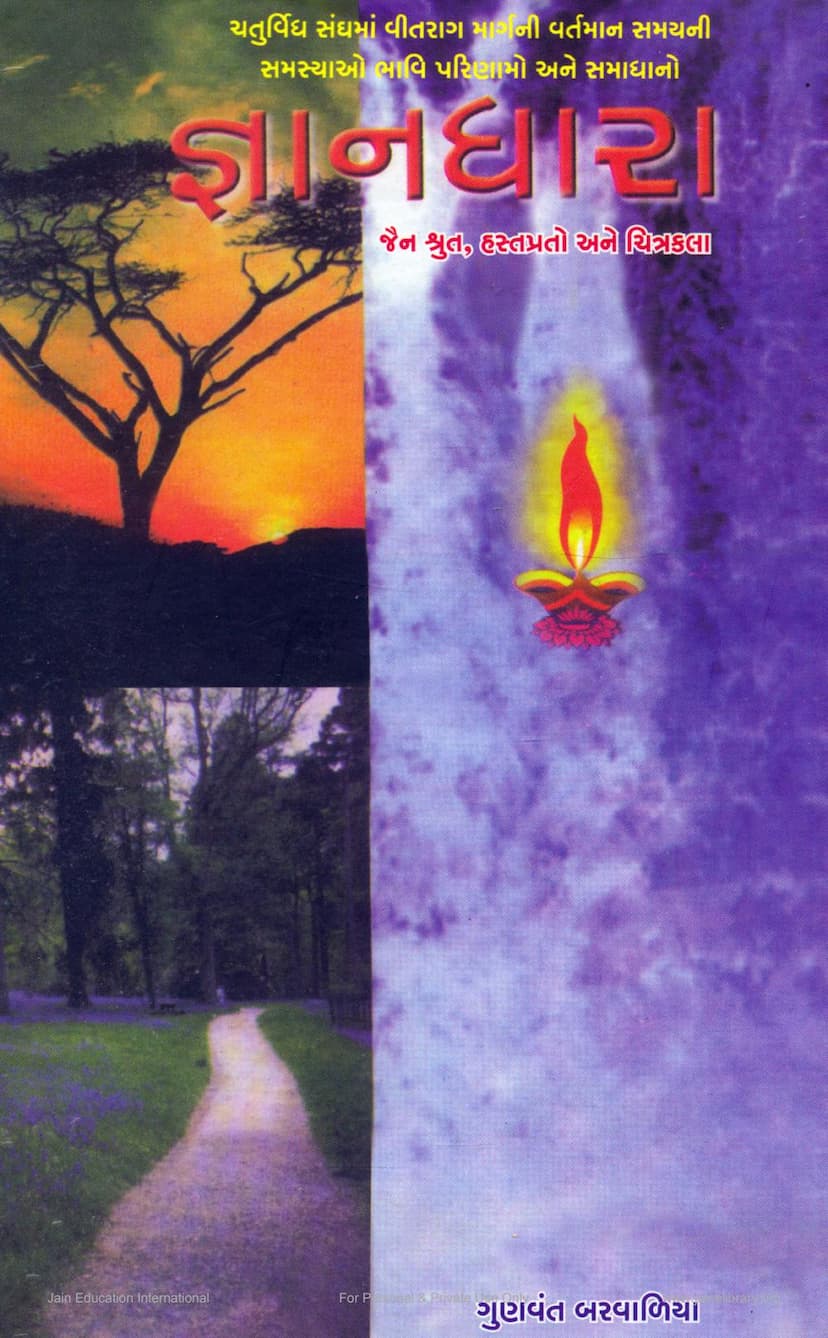Gyandhara
Added to library: September 1, 2025

Summary
This Jain text, titled "Gyandhara" (meaning "Stream of Knowledge"), edited by Gunvant Barvalia and published by Saurashtra Kesari Pranguru Jain Philosophical and Literary Research Centre in April 2014, is a collection of essays and research papers presented at the 11th Jain Literature Knowledge Session. The main theme revolves around the "Four-fold Jain Community (Chaturvidh Sangh), its current problems in the Vitraag Marg, their future consequences, and solutions."
The book is a compilation of various perspectives from scholars and esteemed individuals within the Jain community, addressing contemporary issues and offering solutions. The title page itself highlights the overarching theme of "Problems of the Vitrag Marg in the Chaturvidh Sangh in the Present Time, their Future Consequences and Solutions."
Key Themes and Content:
The collection delves into a wide range of topics crucial for the well-being and progress of the Jain community, including:
- The Role and Challenges of the Chaturvidh Sangh: Several articles discuss the structure and functioning of the four-fold Jain community (monks, nuns, laymen, and laywomen) and the challenges they face in modern times. This includes issues of declining adherence to strict practices, the need for adaptation, and maintaining the essence of Jainism in a changing world.
- Modernization and Technology: A significant portion of the book addresses the integration of modern technology and conveniences (like electricity, computers, mobile phones) within the Jain way of life. Authors debate the judicious use of these tools, the boundaries, and whether they are conducive to spiritual progress or create distractions.
- Spiritual and Ethical Practices: Several papers focus on the core tenets of Jainism, such as non-violence (ahimsa), karma, soul-consciousness (aatma), spiritual practices like meditation and fasting, and the importance of inner purity over mere ritualistic observance. There's a discussion on how to prevent the forgetting of fundamental spiritual practices due to an overemphasis on rituals.
- Youth Engagement: A recurring theme is the need to attract and engage the younger generation in Jainism. Several articles explore methods to make religious education relevant and appealing to youth, emphasizing understanding over rote memorization, the role of modern teaching techniques, and creating engaging religious environments.
- Social Harmony and Unity: The text touches upon the importance of unity within the Jain community, addressing differences in interpretations of traditions and festivals (like Paryushan and Samvatsari) and advocating for a harmonious approach.
- The Legacy of Acharya Hemchandracharya: A substantial portion of the book is dedicated to the monumental contributions of Acharya Hemchandracharya, particularly his linguistic and literary works like "Siddh-Hem Shabdanushasan." His influence on Gujarati language and literature, and his role as a cultural icon are highlighted.
- Role of Jain Organizations and Institutions: The book emphasizes the importance of Jain organizations, trusts, and research centers like the Saurashtra Kesari Pranguru Jain Philosophical and Literary Research Centre in preserving and propagating Jain knowledge.
- Preservation of Jain Heritage: The significance of preserving ancient Jain manuscripts, their digitization, and making them accessible to researchers and the public is discussed, highlighting the rich artistic and literary heritage.
- Challenges for Monks and Nuns: Some articles address the physical and mental health of monks and nuns, the difficulties they face in modern times due to changing environments and societal expectations, and the need for proper support and facilities.
- The Importance of Knowledge and Education: The book underscores the need for both traditional scriptural knowledge and modern education, suggesting ways to integrate them for the holistic development of individuals and the community.
- The Concept of Daana (Charity): The various aspects of charity in Jainism, its importance, different forms, and the proper way to practice it are discussed, advocating for judicious and impactful giving.
- The Role of Women: Several papers highlight the significant role of Jain women in preserving and propagating Jain traditions and values within families and the community.
- The Scientific Aspect of Jainism: Some articles attempt to bridge the gap between Jain philosophy and modern scientific findings, suggesting parallels and exploring the scientific basis for certain Jain principles.
- Ethical Dilemmas and Solutions: The book grapples with complex issues like the use of electricity by monks, the nuances of vegetarianism in modern contexts, and the challenges of adhering to ancient practices in a globalized world, proposing thoughtful considerations and potential solutions.
In essence, "Gyandhara" serves as a platform for introspection and discussion within the Jain community, aiming to identify challenges, understand their implications, and propose practical solutions to ensure the continued relevance and flourishing of Jainism in the contemporary world. It reflects a commitment to preserving the core values while adapting to the evolving landscape of the modern era.